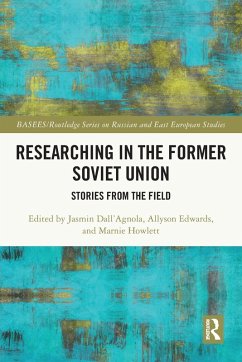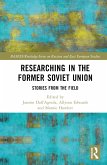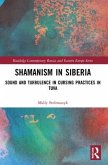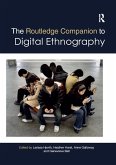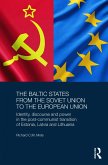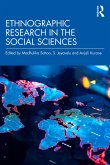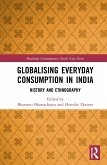Researching in the Former Soviet Union
Stories from the Field
Herausgeber: Dall'Agnola, Jasmin; Howlett, Marnie; Edwards, Allyson
Researching in the Former Soviet Union
Stories from the Field
Herausgeber: Dall'Agnola, Jasmin; Howlett, Marnie; Edwards, Allyson
- Broschiertes Buch
- Merkliste
- Auf die Merkliste
- Bewerten Bewerten
- Teilen
- Produkt teilen
- Produkterinnerung
- Produkterinnerung
Written for early-career scholars still in the planning stages of their research, this book explores some of the challenges researchers face when conducting fieldwork in the former Soviet region.
Andere Kunden interessierten sich auch für
![Researching in the Former Soviet Union Researching in the Former Soviet Union]() Researching in the Former Soviet Union181,99 €
Researching in the Former Soviet Union181,99 €![Shamanism in Siberia Shamanism in Siberia]() Mally StelmaszykShamanism in Siberia66,99 €
Mally StelmaszykShamanism in Siberia66,99 €![The Routledge Companion to Digital Ethnography The Routledge Companion to Digital Ethnography]() The Routledge Companion to Digital Ethnography50,99 €
The Routledge Companion to Digital Ethnography50,99 €![Memory, the City and the Legacy of World War II in East Central Europe Memory, the City and the Legacy of World War II in East Central Europe]() Uilleam Blacker (UK University of Oxford)Memory, the City and the Legacy of World War II in East Central Europe66,99 €
Uilleam Blacker (UK University of Oxford)Memory, the City and the Legacy of World War II in East Central Europe66,99 €![The Baltic States from the Soviet Union to the European Union The Baltic States from the Soviet Union to the European Union]() Richard Mole (UK University College London)The Baltic States from the Soviet Union to the European Union84,99 €
Richard Mole (UK University College London)The Baltic States from the Soviet Union to the European Union84,99 €![Ethnographic Research in the Social Sciences Ethnographic Research in the Social Sciences]() Ethnographic Research in the Social Sciences43,99 €
Ethnographic Research in the Social Sciences43,99 €![Globalising Everyday Consumption in India Globalising Everyday Consumption in India]() Globalising Everyday Consumption in India42,99 €
Globalising Everyday Consumption in India42,99 €-
-
-
Written for early-career scholars still in the planning stages of their research, this book explores some of the challenges researchers face when conducting fieldwork in the former Soviet region.
Hinweis: Dieser Artikel kann nur an eine deutsche Lieferadresse ausgeliefert werden.
Hinweis: Dieser Artikel kann nur an eine deutsche Lieferadresse ausgeliefert werden.
Produktdetails
- Produktdetails
- BASEES/Routledge Series on Russian and East European Studies
- Verlag: Taylor & Francis Ltd
- Seitenzahl: 170
- Erscheinungstermin: 26. August 2024
- Englisch
- Abmessung: 234mm x 156mm x 9mm
- Gewicht: 276g
- ISBN-13: 9780367699956
- ISBN-10: 0367699958
- Artikelnr.: 71231637
- Herstellerkennzeichnung
- Libri GmbH
- Europaallee 1
- 36244 Bad Hersfeld
- gpsr@libri.de
- BASEES/Routledge Series on Russian and East European Studies
- Verlag: Taylor & Francis Ltd
- Seitenzahl: 170
- Erscheinungstermin: 26. August 2024
- Englisch
- Abmessung: 234mm x 156mm x 9mm
- Gewicht: 276g
- ISBN-13: 9780367699956
- ISBN-10: 0367699958
- Artikelnr.: 71231637
- Herstellerkennzeichnung
- Libri GmbH
- Europaallee 1
- 36244 Bad Hersfeld
- gpsr@libri.de
Jasmin Dall'Agnola is an Associated Research Fellow at the Organization for Security and Cooperation in Europe (OSCE) Academy in Bishkek. Her research centers on the relationship between gender, governance, and technology in post-Soviet Central Asia. She has been awarded a prestigious two-year, full-time Postdoc. Mobility Fellowship from the Swiss National Science Foundation, to explore the implications of the COVID-19 pandemic on smart city technologies in Central Asia. In her role as founder and acting chair of the Eurasian, East and Central European Studies Women Academics Forum (EECES WAF), Jasmin is involved in various collaborative research and networking endeavors to address gender disparity in academia. Allyson Edwards research examines Militarism in Post-Soviet Russia, more specifically, the mechanisms behind latent militarization between 1990 and 2000. She is currently a lecturer in Global History at Bath Spa University and plays a wider role in the academic community as Vice-Chair of the EECES WAF. She specializes in topics related to militarism, memory, education, and parades in the Russian/Eurasian space. Marnie Howlett is a Departmental Lecturer in Politics in the Department of Politics and International Relations at the University of Oxford. She has held Fellowships supported by the Social Sciences and Humanities Research Council of Canada (SSHRC), the Canadian Foundation for Ukrainian Studies, and the John Fell Fund. Marnie was a Deputy Editor for Millennium: Journal of International Studies, vol. 48 and currently sits on the editorial board for Qualitative Research. Her research centers on the intersection of nationalism, geopolitics, and cartography within the former Soviet Union, particularly Ukraine.
Preface. Introduction: The Challenges of Fieldwork in Post-Soviet
Societies. Part I: Stories from the Post-Soviet Field. 1.Understanding and
Managing One's Own Mistrust: The Value of Embodied Ethnography during
Fieldwork in a Contested Postwar Polity. 2.Doing Fieldwork (Not Quite) at
Home: Reflecting on an Expat's Positionality in Lithuania. 3.A Woman of Her
Word Prepared for the Worst: Researching Drug Trafficking in Kazakhstan.
Part II: Stories from the Hybrid Field. 4."Hanging Out" with the Boys: The
Female Participant Observer in a Male-Dominated Group. 5.Balancing
Diasporic Ties and Research: A Ukrainian-Canadian's Reflection on Fieldwork
in Ukraine. Part III: Stories from the Digital Field. 6.Listening and Its
Limits: Reflections on Fieldwork in/on Kyrgyzstan. 7.The Academic Lion
Skin: Balancing Doctoral Research with Motherhood. Afterword: Gaining
Access to the Field
Societies. Part I: Stories from the Post-Soviet Field. 1.Understanding and
Managing One's Own Mistrust: The Value of Embodied Ethnography during
Fieldwork in a Contested Postwar Polity. 2.Doing Fieldwork (Not Quite) at
Home: Reflecting on an Expat's Positionality in Lithuania. 3.A Woman of Her
Word Prepared for the Worst: Researching Drug Trafficking in Kazakhstan.
Part II: Stories from the Hybrid Field. 4."Hanging Out" with the Boys: The
Female Participant Observer in a Male-Dominated Group. 5.Balancing
Diasporic Ties and Research: A Ukrainian-Canadian's Reflection on Fieldwork
in Ukraine. Part III: Stories from the Digital Field. 6.Listening and Its
Limits: Reflections on Fieldwork in/on Kyrgyzstan. 7.The Academic Lion
Skin: Balancing Doctoral Research with Motherhood. Afterword: Gaining
Access to the Field
Preface. Introduction: The Challenges of Fieldwork in Post-Soviet
Societies. Part I: Stories from the Post-Soviet Field. 1.Understanding and
Managing One's Own Mistrust: The Value of Embodied Ethnography during
Fieldwork in a Contested Postwar Polity. 2.Doing Fieldwork (Not Quite) at
Home: Reflecting on an Expat's Positionality in Lithuania. 3.A Woman of Her
Word Prepared for the Worst: Researching Drug Trafficking in Kazakhstan.
Part II: Stories from the Hybrid Field. 4."Hanging Out" with the Boys: The
Female Participant Observer in a Male-Dominated Group. 5.Balancing
Diasporic Ties and Research: A Ukrainian-Canadian's Reflection on Fieldwork
in Ukraine. Part III: Stories from the Digital Field. 6.Listening and Its
Limits: Reflections on Fieldwork in/on Kyrgyzstan. 7.The Academic Lion
Skin: Balancing Doctoral Research with Motherhood. Afterword: Gaining
Access to the Field
Societies. Part I: Stories from the Post-Soviet Field. 1.Understanding and
Managing One's Own Mistrust: The Value of Embodied Ethnography during
Fieldwork in a Contested Postwar Polity. 2.Doing Fieldwork (Not Quite) at
Home: Reflecting on an Expat's Positionality in Lithuania. 3.A Woman of Her
Word Prepared for the Worst: Researching Drug Trafficking in Kazakhstan.
Part II: Stories from the Hybrid Field. 4."Hanging Out" with the Boys: The
Female Participant Observer in a Male-Dominated Group. 5.Balancing
Diasporic Ties and Research: A Ukrainian-Canadian's Reflection on Fieldwork
in Ukraine. Part III: Stories from the Digital Field. 6.Listening and Its
Limits: Reflections on Fieldwork in/on Kyrgyzstan. 7.The Academic Lion
Skin: Balancing Doctoral Research with Motherhood. Afterword: Gaining
Access to the Field

